Travel Deeper: How Cultural Respect Creates Truly Sustainable Tourism 1) True sustainability goes beyond eco‑habits—it begins with a respectful mindset toward local cultures. 2) Cultural respect strengthens the three pillars of tourism: environmental protection, economic resilience, and socio‑cultural preservation. 3) Empowering communities as guardians, artisans, and storytellers ensures conservation and dignified livelihoods. 4) Travel becomes legacy‑building when it shifts from extraction to authentic human connection.
The Art of Slow Travel: Connecting Deeper with People, Places and Purpose
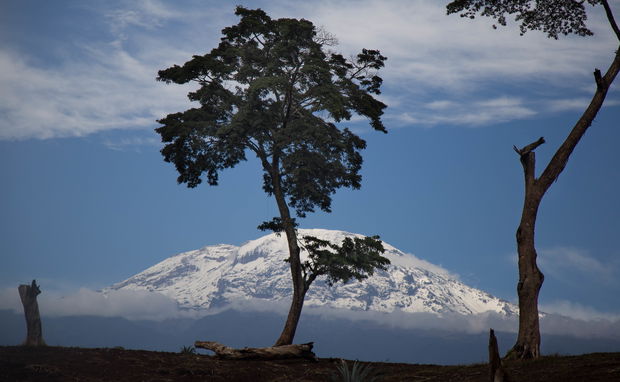
Slow travel makes you value each moment. You can walk through vibrant markets or have coffee at sunrise. It is more about the journey than the destination. It keeps you in the moment and helps you make authentic connections. You can eat home-cooked meals or help plant trees in villages. Through creating a sense of belonging, slow travel reveals secret treasures, forges deep connections, and opens your eyes. This is in alignment with Paulo Coelho's belief of looking for the extraordinary in the ordinary.
Slow travel also brings real benefits to the environment and the economy. Longer stays lower carbon footprints and keep tourism dollars in local communities. This resonates with Carlo Petrini’s Slow Food philosophy. As a solution to overtourism, Kijani Tours offers small-group trips during off-peak times and away from crowded spots. These itineraries help spread out visitors, protect cultures, and strengthen destinations.
The Art of Slow Travel: Connecting Deeper with People, Places and Purpose
In a world that gets faster every year, slow travel is a quiet revolution. It Is the choice to substitute the whirlwind for rhythm, the to-do list for presence, and the momentary photo for a story that you will treasure for the rest of your life.
Slow travel to us at Kijani Tours is more than a trend, it is a lifestyle. It is about sticking around long enough for a place to welcome you into their heart, for the people you travel to to become like family, and for landscapes to get into your heart.
The Roots: From Slow Food to Slow Travel
The story begins in 1986, when Carlo Petrini and his fellow demonstrators gathered on Rome's Piazza di Spagna to demonstrate against the opening of a McDonald's near the Spanish Steps. They were not merely combatting to preserve Italian cuisine—they were combatting to preserve an existence. The Slow Food movement was born out of that protest, a love letter to local ingredients, traditional production, and the joy of eating with purpose.
By 1989, 15 nations had had their representatives sign the Slow Food Manifesto, declaring the right to enjoy life, appreciate craftsmanship, and defend cultural and natural diversity. The philosophy soon spread beyond the table—into education, fashion, city planning, and tourism—becoming a world-wide reminder that progress sometimes means slowing down.
Slow travel carries this DNA with it. It takes from the same spirit: locality, sustainability, and mindful living. It asks us to choose fewer destinations, stay longer in each, support local economies, and appreciate spontaneity, reflection, and cross-cultural exchange over tick-box sightseeing.
The Heart of Slow: A Philosophy of Presence
Slow travel is more than a trend; it's a thoughtful approach to connecting with cultures and communities. At its core, it is about finding the "right speed," allowing for the savoring of hours and minutes rather than merely counting them. As Carl Honoré, author of In Praise of Slow, wisely puts it: "The great benefit of slowing down is reclaiming the time and tranquility to make meaningful connections—with people, with culture, with work, with nature, with our own bodies and minds." It is a fundamental rejection of the rushed, "checklist" mentality of conventional tourism. From savoring homemade meals at family-run eateries to planting trees in local villages with Kijani Tours, every moment transforms into a meaningful exchange. This style of travel allows us to bypass the rush and delve deeper into experiences that last a lifetime.
With slow travel, you will discover hidden gems that guidebooks overlook, forge bonds with people who redefine your worldview, and witness the unfolding beauty of places without haste. It is about cultivating "place attachment"—an emotional, cognitive, and functional bond that allows you to truly feel connected to a destination. This conscious engagement, as research on savoring highlights, fosters increased positive emotional experiences, leading to sustained enjoyment and a stronger intention to revisit. Learn why slowing down has the power to enrich not only your travels but also your perspective on life. As Paulo Coelho shares in The Alchemist: "The simple things are also the most extraordinary things, and only the wise can see them." Slow travel is about finding the extraordinary in the seemingly simple.
The Benefits of Slow Travel
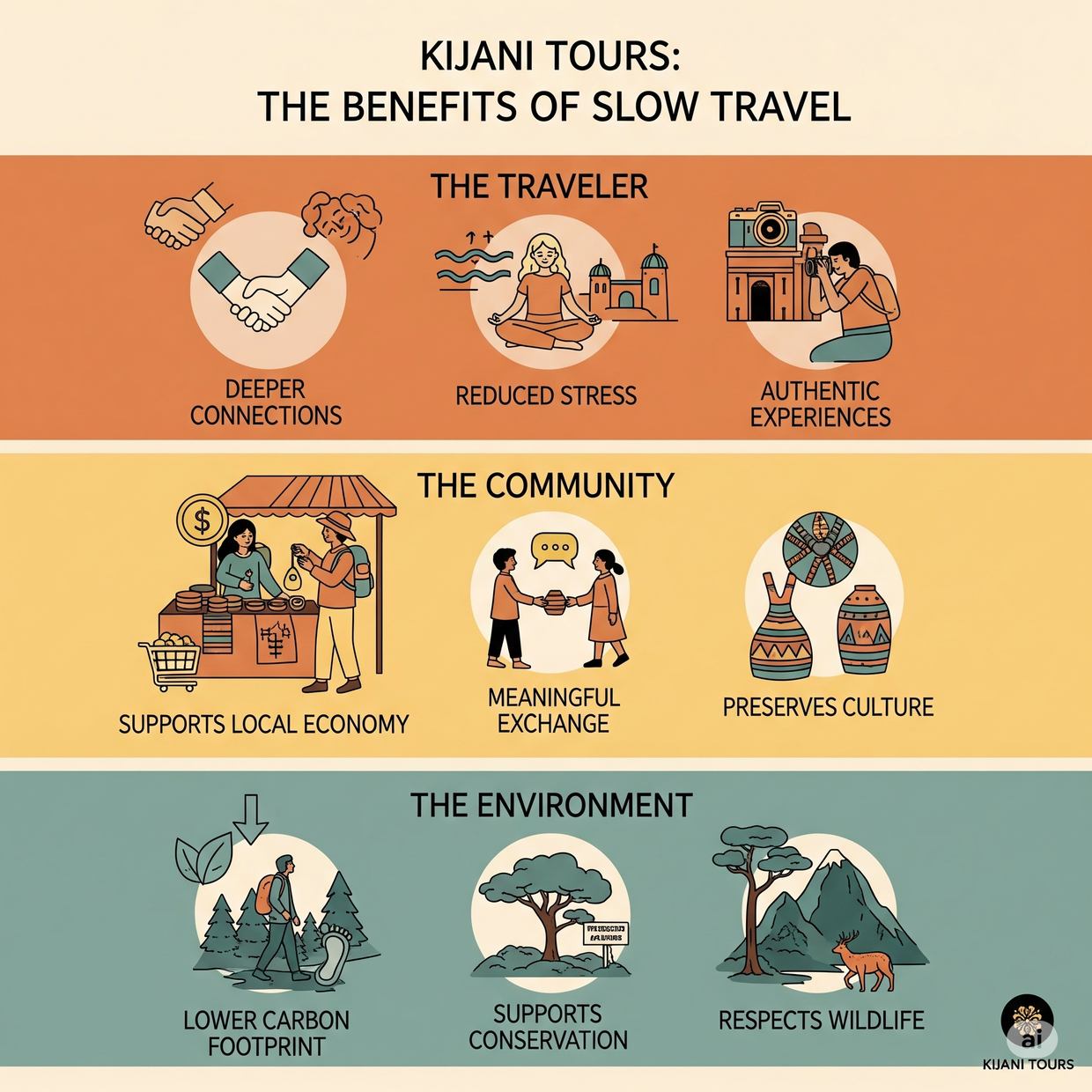
The Counterpoint: Overtourism's Urgent Call
The rise of slow and responsible travel is a response to the increasing overtourism problem. Too many tourists packing a destination's carrying capacity means there is too much to pay: overcrowding, degradation of the environment, stressed infrastructure, and loss of quality of life for residents. As Martha Honey, co-author of Overtourism: Lessons for a Better Future, has suggested, the challenge is to reconcile "sustainable livelihoods, enduring conservation, and high-quality traveler experiences." Overtourism commercializes culture, displaces residents, and destroys the very authenticity that lured visitors in the first place.
This is precisely what Kijani Tours is fighting against. By promoting off-the-beaten-path itineraries, with small group sizes and off-season travel encouragement, Kijani goes out of its way to disperse tourists and relieve pressure from stretched hotspots. It's about turning your journey not only into a fly-by visit, but into a real contribution.
Kijani's Strategic Path: Crafting Authentic Journeys
Kijani Tours is based on the precepts of responsible and thoughtful travel—beyond minimizing footprint to actually restoring and enriching destinations. This is why our experiences are designed to form meaningful connections and leave a positive lasting impression. We prioritize community well-being, sustainable visitor management, and a commitment to responsible and respectful practices.
Whether a customized wildlife safari designed for quiet immersion, a food tour or cultural immersion that actively involves you with the local cuisine, or a cultural workshop taught by community member, Kijani ensures each experience respects and enriches the individuals and places visited. We are forcefully reminded by Sir David Attenborough: "In our hands now lies not only our own future, but that of all other living creatures with whom we share the Earth." Kijani Tours takes this responsibility seriously, and invites you to travel with purpose.
Reimagine Your Path with Kijani
Join the beat of slow travel with Kijani Tours. Let us together discover the art of meaningful connections and craft journeys that touch the soul. Whether walking through verdant landscapes or interacting with hands-on cultural experiences, the way ahead is one of genuineness. Ready to revolutionize your travels and be a conscious explorer? Let's embark on the journey.
Expand Your World with Kijani Tours: Where Adventure Meets Purpose
This blog explores the breathtaking drama of the wildebeest calving season in Tanzania’s southern Serengeti, where over 500,000 calves are born within a few short weeks between January and March. It highlights the synchronized birthing strategy known as predator satiation, which helps ensure survival by overwhelming predators, such as lions, cheetahs, and hyenas, with sheer numbers. The piece captures the emotional intensity of this natural phenomenon—where life and death unfold in real...
The article depicts climbing Mount Kilimanjaro as a journey of personal growth, emphasizing inner transformation, resilience, and empowerment rather than mere physical achievement, highlighting profound connections and lasting change through struggle and triumph.
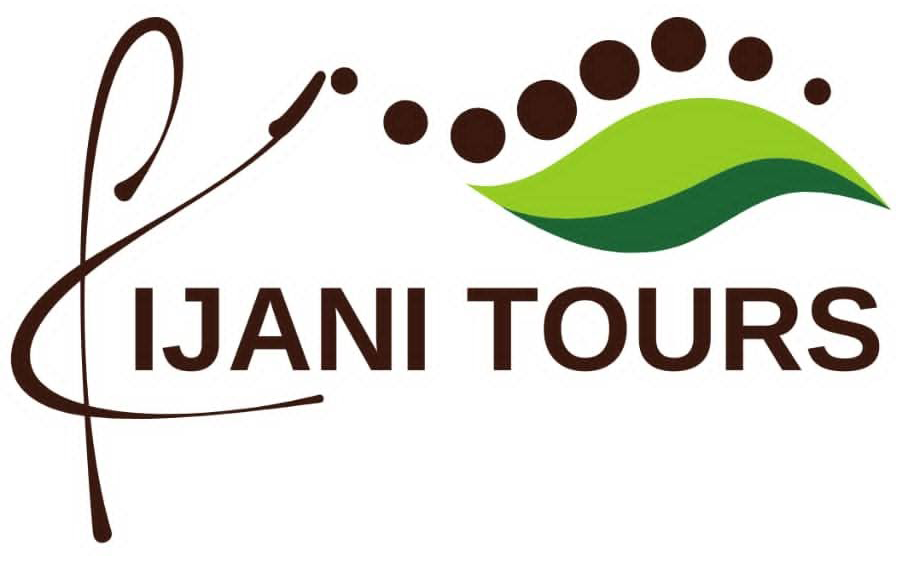
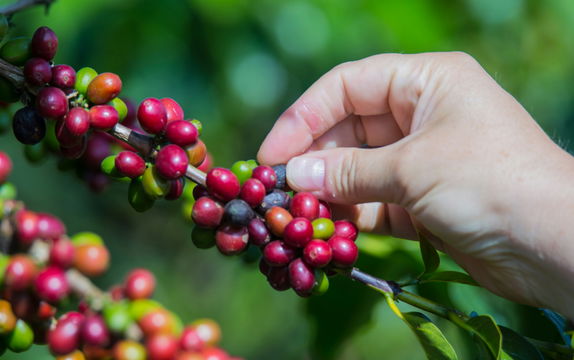
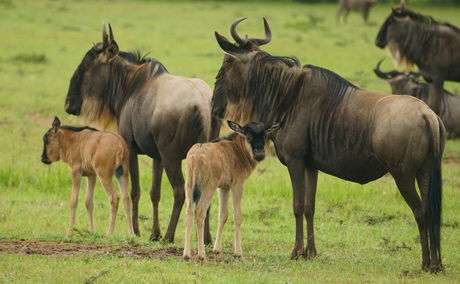
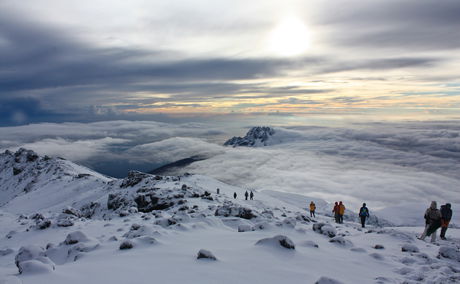
Share This Post